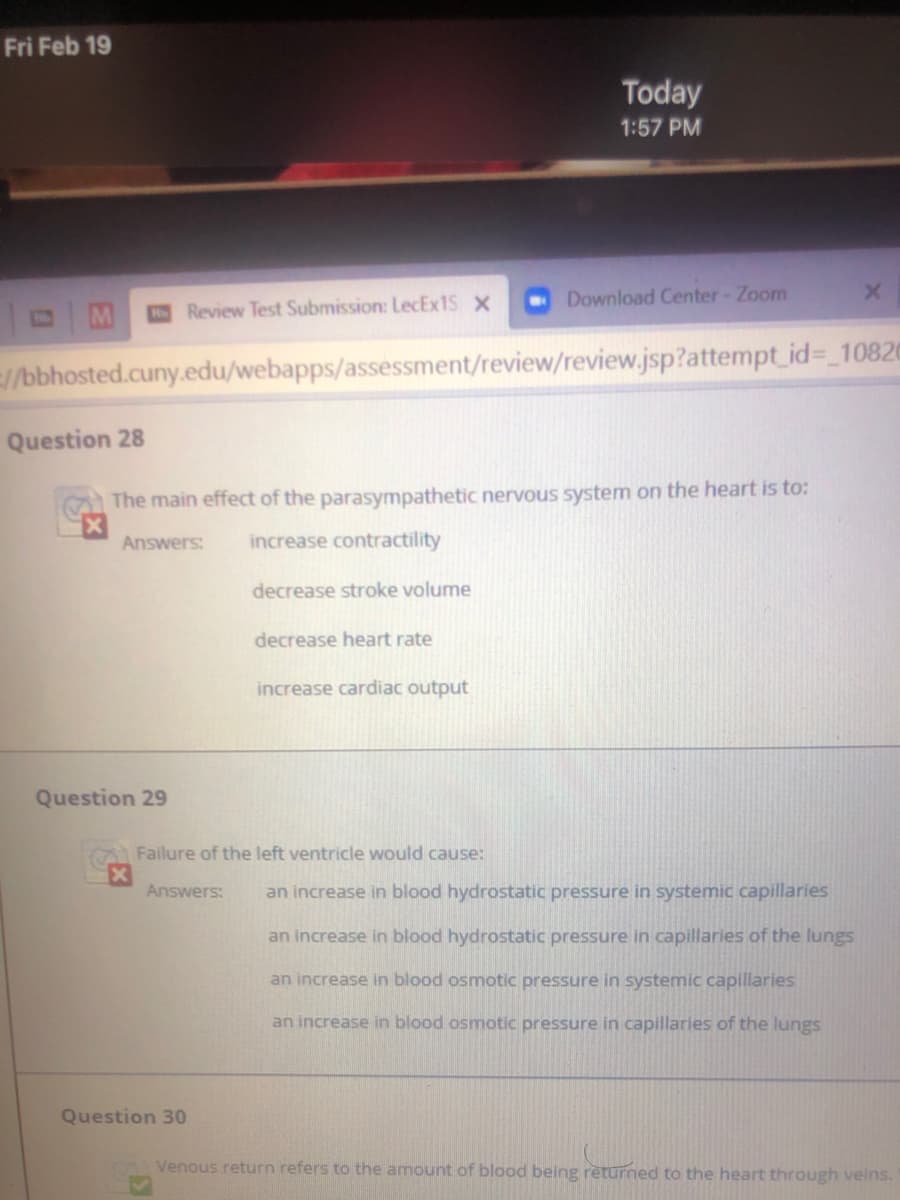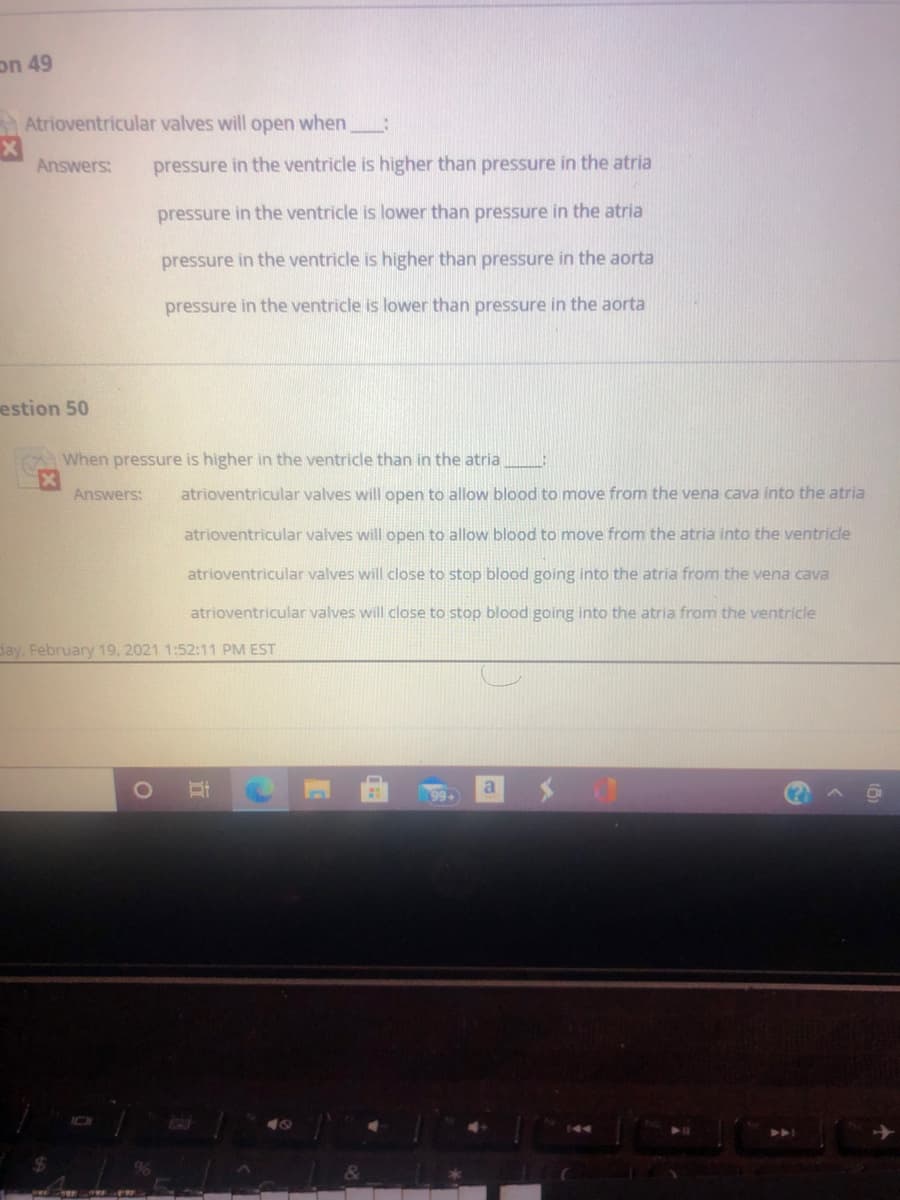7) which of the following has the thickest wall? A) left ventricle B) right ventricle C) left atrium D) right atrium 10) which blood vessels does blood enter during ventricle systole? A) pulmonary trunk and the pulmonary vein B) the pulmonary trunk and the aorta C) aorta and pulmonary veins D) aorta and vena cava
7) which of the following has the thickest wall? A) left ventricle B) right ventricle C) left atrium D) right atrium 10) which blood vessels does blood enter during ventricle systole? A) pulmonary trunk and the pulmonary vein B) the pulmonary trunk and the aorta C) aorta and pulmonary veins D) aorta and vena cava
Human Physiology: From Cells to Systems (MindTap Course List)
9th Edition
ISBN:9781285866932
Author:Lauralee Sherwood
Publisher:Lauralee Sherwood
Chapter9: Cardiac Physiology
Section9.3: Mechanical Events Of The Cardiac Cycle
Problem 2CYU
Related questions
Question
7) which of the following has the thickest wall?
A) left ventricle
B) right ventricle
C) left atrium
D) right atrium
10) which blood vessels does blood enter during ventricle systole?
A) pulmonary trunk and the pulmonary vein
B) the pulmonary trunk and the aorta
C) aorta and pulmonary veins
D) aorta and vena cava
25- which heart chamber first receives blood directly from the superior and inferior vena cava?
Left ventricle
Right ventricle
Left atrium
Right atrium

Transcribed Image Text:Fri Feb 19
Today
1:57 PM
Download Center- Zoom
Review Test Submission: LecEx1S X
/bbhosted.cuny.edu/webapps/assessment/review/review.jsp?attempt_id%3 10820
Question 28
The main effect of the parasympathetic nervous system on the heart is to:
Answers:
increase contractility
decrease stroke volume
decrease heart rate
increase cardiac output
Question 29
Failure of the left ventricle would cause:
Answers:
an increase in blood hydrostatic pressure in systemic capillaries
an increase in blood hydrostatic pressure in capillaries of the lungs
an increase in blood osmotic pressure in systemic capillaries
an increase in blood osmotic pressure in capillaries of the lungs
Question 30
Venous return refers to the amount of blood being returned to the heart through veins.

Transcribed Image Text:on 49
Atrioventricular valves will open when:
Answers:
pressure in the ventricle is higher than pressure in the atria
pressure in the ventricle is lower than pressure in the atria
pressure in the ventricle is higher than pressure in the aorta
pressure in the ventricle is lower than pressure in the aorta
estion 50
When pressure is higher in the ventricle than in the atria
Answers:
atrioventricular valves will open to allow blood to move from the vena cava into the atria
atrioventricular valves will open to allow blood to move from the atria into the ventricle
atrioventricular valves will close to stop blood going into the atria from the vena cava
atrioventricular valves will close to stop blood going into the atria from the ventricle
day, February 19, 2021 1:52:11 PM EST
a
Expert Solution
This question has been solved!
Explore an expertly crafted, step-by-step solution for a thorough understanding of key concepts.
Step by step
Solved in 3 steps

Knowledge Booster
Learn more about
Need a deep-dive on the concept behind this application? Look no further. Learn more about this topic, biology and related others by exploring similar questions and additional content below.Recommended textbooks for you

Human Physiology: From Cells to Systems (MindTap …
Biology
ISBN:
9781285866932
Author:
Lauralee Sherwood
Publisher:
Cengage Learning


Biology: The Dynamic Science (MindTap Course List)
Biology
ISBN:
9781305389892
Author:
Peter J. Russell, Paul E. Hertz, Beverly McMillan
Publisher:
Cengage Learning

Human Physiology: From Cells to Systems (MindTap …
Biology
ISBN:
9781285866932
Author:
Lauralee Sherwood
Publisher:
Cengage Learning


Biology: The Dynamic Science (MindTap Course List)
Biology
ISBN:
9781305389892
Author:
Peter J. Russell, Paul E. Hertz, Beverly McMillan
Publisher:
Cengage Learning

Anatomy & Physiology
Biology
ISBN:
9781938168130
Author:
Kelly A. Young, James A. Wise, Peter DeSaix, Dean H. Kruse, Brandon Poe, Eddie Johnson, Jody E. Johnson, Oksana Korol, J. Gordon Betts, Mark Womble
Publisher:
OpenStax College

Biology (MindTap Course List)
Biology
ISBN:
9781337392938
Author:
Eldra Solomon, Charles Martin, Diana W. Martin, Linda R. Berg
Publisher:
Cengage Learning

Basic Clinical Lab Competencies for Respiratory C…
Nursing
ISBN:
9781285244662
Author:
White
Publisher:
Cengage